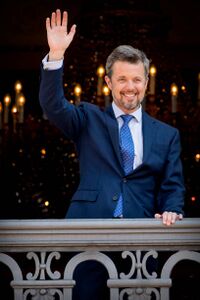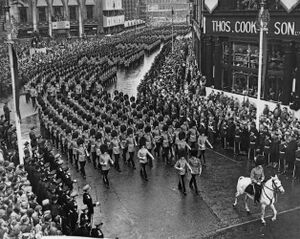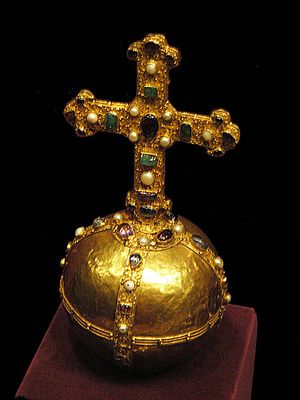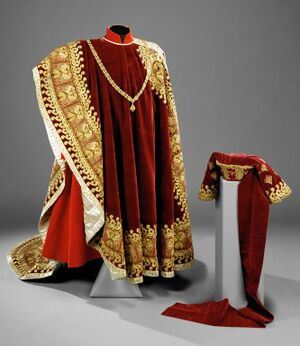Coronation of King Hendrik V: Difference between revisions
(→Guests) |
(→Guests) |
||
| Line 163: | Line 163: | ||
* {{team flag|Çakaristan|flag}} [[Akbar I|Akbar Çakar]], sultan of [[Çakaristan]], and [[Jodha Avchat]], sultana of [[Çakaristan]]. | * {{team flag|Çakaristan|flag}} [[Akbar I|Akbar Çakar]], sultan of [[Çakaristan]], and [[Jodha Avchat]], sultana of [[Çakaristan]]. | ||
* {{team flag|Elwynn|flag}} [[Anosh Sarkash]], [[Commission of Foreign Affairs|Commissioner of Foreign Affairs]] | |||
* {{team flag|Hurmu|flag}} [[Jan Spiik]] and [[Ellen Aarevalla]], [[Senate of the Lakes|Senators of the Lakes]], on behalf of the Senate | |||
* {{team flag|Shireroth|flag}} [[Salome|Salome Ylva Octavia Ayreon-Kalirion ibn al-Majeed al-Osman bin Sathrati of Waffel-Paine]], kaiseress of [[Shireroth]]. | * {{team flag|Shireroth|flag}} [[Salome|Salome Ylva Octavia Ayreon-Kalirion ibn al-Majeed al-Osman bin Sathrati of Waffel-Paine]], kaiseress of [[Shireroth]]. | ||
* {{team flag|Jingdao|flag}}[[Jin San]], Diwang of the [[Great Jing]], and [[Houdezaiwu]], heir apparent of the [[Great Jing]]. | * {{team flag|Jingdao|flag}}[[Jin San]], Diwang of the [[Great Jing]], and [[Houdezaiwu]], heir apparent of the [[Great Jing]]. | ||
Revision as of 20:21, 30 December 2020
The coronation of king Hendrik V as King of Batavia took place at the Cathedral of 's Koningenwaarde on the 1.XV.1691 AN (29 December 2020).
Background
After his brother, Arkadius Frederik Gustavus des Vinandy, had left his homeland, the Franco-Batavian Empire had fallen and renounced the Lion's Throne, Henry travelled to the city of his ancestors, Vinandy. Despite the uncertain times, he governed the lordship as Prince of Vinandy. After five years, the call for a Batavian on the Lion's Throne rose, with the Vinandists preferring to crown the daughter of the last king, Elisabeth Asara des Vinandy, as Queen of Batavia. Only this met with resistance from the Windsorists, who wanted a Vinandy on the throne, but peace with Raspur-nations. Certainly, because after the resignation of Arkadius IV of Vinandy a state holder had been appointed: Salome Ylva Octavia Ayreon-Kalirion ibn al-Majeed al-Osman bin Sathrati of Waffel-Paine.
Because Elisabeth Asara comes of age on 1.XV.1692 AN, she could claim the throne. This would give rise to the eternal discussion as to whether Elisabeth Asara is the daughter of Arkadius Frederik Gustavus or Cledywn Starshade. To be in favour of this, Hendrik Leopold des Vinandy was asked to ascend the throne. This was elaborated in the Tripartite Treaty.
The Royal ceremony
Abdication
A small ceremony was held in the Blanckenhof Palace. Three people sat at a round table: Joseph Bartholomeus des Vinandy-Windsor, Prince of Davignon and Constitutional Regent; Salome Ylva Octavia Ayreon-Kalirion ibn al-Majeed al-Osman bin Sathrati of Waffel-Paine, State Holder of Batavia and Kaiseress of Shireroth; Hendrik Leopold des Vinandy, Prince of Vinandy. There was an awkward silence, until Joseph broke it: 'On behalf of the Batavian people, I would like to express my gratitude that you, Kaiseress of Shireroth, wanted to occupy the Lion's Throne. We are grateful for your efforts'. The Kaiseress nodded. Then Joseph turned to Henry and said: "The Batavian people are very pleased to welcome you as king. In spite of the fact that you did not choose to take on this task. But history seems to be repeating itself. King Arkadius II of Vinandy succeeded his brother. Then a golden age dawned." Henry nodded and replied: "The difficult task of kingship is already great, but a king does not only usher in a golden age. It requires the commitment of his people.”
The document of abdication was presented. Three copies, the three people at the round table signed a version, after which it was passed on to the one on the right. This happened until all three copies had three signatures. This ended the statehood and formally transferred the royal authority to Hendrik Leopold des Vinandy. Salome said: "Long live the King!”
Procession to the Catodral
A delegation from the Lagerhuis and Hogerhuis were chilled out in front of the gate of the Cathedral of 's Koningenwaarde. The old Prince of Davignon, Joseph des Vinandy-Windsor, was rubbing his hands, while next to him a young nobleman was alternately grumbling and clapping his teeth. The applause and cheers of the crowd enthusiastically waving their flags awaiting the arrival of the Golden Coach did not hurt them much.
"It may not be a Kalirion, but Henry is a good man," Joseph whispered to himself and his neighbour. The young man looked grumpy. He was an Ultraroyalist, one of the nobility and wealthy bourgeoisie. He was one of the men who preferred a distant queen to one who could look at his fingers. He cast a suspicious glance at the members of the House of Commons who were waiting a little further on, on the other side of the entrance. Joseph sighed almost inaudibly: this was not the mentality he had in mind when he offered Salome the throne. Selfishness was far from having disappeared from what had once been Benacia's most democratic country. Not that it was a title with a lot of competition...
Yet he had hope: under Salome, the Lagerhuis had drawn more power to itself. The distance between Shirekeep and 's Koningenswaarde, the language differences and - even a certain indifference towards the remote Batavian areas - the Vinandists had regained their influence. After in-depth discussions, the Royal Government, in agreement with the Staatsholder, had decided to put another member of the House of Vinandy on the throne. The ink of her resignation was not yet dry, or the coronation ceremony would begin.
Joseph smiled, despite the freezing cold, and ignored his neighbour's grumbling. In the distance he heard the marching music, paired walking with loud cheering. He was there.
The delegates bent over deeply when the golden carriage stopped in front of them. 'Long live the king', the old prince spoke to himself.
After the new King meditated for half an hour with a catologian monk, the Golden Carriage was driven in front. The new King and his wife took place in the carriage. The route of the procession is longer than the one in 1669 AN, when his older brother was driven from Huys te Vredebreght to the Catodral. At that time Blanckenhof Palace did not yet exist. His brother was Prime Minister of Batavia for his kingship. Henry is a nobleman, but had never had a political or royal role before.
The golden carriage already served at the coronation of Arkadius I des Vinandy. After that many kings and queens took it to the Cathedral and for other royal ceremonies. The most recent repairs were made by commander of the city, Xi Tab, at the time when Jingdao ruled the city.
Question of willingness
Arriving at the Catodral, the new king and his wife climbed the stairs over the red carpet. When the new king and his wife entered the hall, the music started to play.
When they arrived in the middle of the Cathedral, they were met by the bishop of Pentapolis (Archbishop), accompanied by the abbots of Clervaux and Kolmar. They loudly proclaim the presence of the King-to-be, bow to the monarch and open the gate. In the meantime, they shout "De Koning - geprezen zijt Cato - is hier!" ("The king - Cato be praised - is here!"), and repeat those words until he's half way the corridor. By then the music resounds through the cathedral, while the honourable guests show their respect while the King walks slowly towards the Archbishop.
Once seated on the Throne, the Archbisshop asks the King a question:
"Hear! Hear! The powerful Cato has been asked for a new king for Batavia. The mighty Cato has answered and appointed Hendrik Leopold des Vinandy. That is why I ask you, Hendrik Leopold des Vinandy, the question: are you willing to be crowned King of Batavia?"
The King shows his willingness to accept by repeating the words:
"I am willing."
This is followed by the archbishop nodding and the King standing up, raising his hand and pronouncing the royal promise of office:
"I promise to the peoples of the Kingdom that I will always preserve and maintain the Constitution. I promise that I will defend and preserve the independence and territory of the Kingdom with all My ability; that I will protect the freedom and the rights of all Batavians and all residents, and to maintain and promote prosperity will employ all means which the laws make available to Me, as a good and faithful King is to do. I promise."
Crowning of the King
After the exchange of promises and oaths, the crowing begins.
Firstly, the Archbisshop hands over the Willemian crown with the words:
"I hereby grant you the Willemian Crown, forged on behalf of good King William the Second, which serves as a symbol of dignity. It connects You with Your function as head of state of the Nation and as Ruler over Your subjects."
This is followed by the passing down of the royal globe, with the words:
"This globe symbolises Your power, both wordly as spiritually, as King over Micras and this Kingdom."
Thereafter follows the royal sceptre, which was in safekeeping with the abbot of Clervaux.
"The sceptre symbolises justice, and the King as highest shepherd and judge of the nation."
The final piece of regalia is the golden fleece, handed over by the abbot of Kolmar. The Archbisshop proclaims the words:
"You are hereby granted the Golden Fleece, a woolen robe made of the finest gold wire. It has been part of the regalia for many generations and was in the possession of the Royal Family which once ruled the Kingdom of 's Koningenwaarde, before it united the territories into one country. Made with the gold of the mines to the east of Bosdaal and fabricated by crafstmen from all across the country."
Throughout the cathedral the sound of angels echoes once again. The catologian bishops bow before their King and make a catologian (cross) sign. The faithful soon follow their example.
"May Cato U, Henry the Fifth, protect against all evil and protect our Kingdom, as it has done for centuries."
Royal speech
The formalities within the catodral end with a royal speech:
| Royal speech (1691 AN) |
|---|
“Highly honoured Batavians and guests, It is 167 Norton years since a brother took over the throne. Arkadius II des Vinandy, my ancestor, was a great man. A righteous and honest man. He ruled this country for 43 Norton years. Time will tell if I repeat history here not only by following my brother, but also to emulate the greatness of my ancestor. My ancestor would not have achieved that without the great acts of the Batavians. Today begins a new opportunity for a new golden age for us. That era is not characterised by war or violence, no lust for expansion, no hunt for old claims. But the pursuit of great cultural heights, prosperity and prosperity. That makes us strong, that makes a golden age a true age. We are the beacon of peace, the light for Micras! The road to such greatness is not without obstacles. We have to deal with the past, without denying it and without discomfort. We will ask the Batavian Parliament to update the Constitution to today's reality. Our sovereign nation will confidently find its position among the great powers of Micras. Therefore, let our motto about Micras be heard: Batavia will continue to exist until the end of the world!" |
The organ begins to play and the choir sings the Staatshymne der Bataven:
| Batavian | Translated in Common Tongue |
|
O prachtig Batavië |
O beautiful Batavia |
End of the ceremony
Loud applause sounded in the Catodral, outside was cheering. "Long live the King!” The organ started to play.
The King rose from the throne. His wife came by his side, together they walked to the entrance of the Catodral. They solemnly greeted the honoured guests along the aisle. The flags of all parts of the country were spread in front of the King, on which the King walked. On the steps of the Catodral the King stands, around him stands the speaker of the Lagerhuis, the Archbishop and the commander of the Batavian Armed Forces. The Batavians cheer and in front of the platform the royal guard parades by. The King and his wife descend the stairs and get into the carriage. The ride is now to the Koninklijk Paleis, which already functioned as royal residence in the time of Arkadius II.
Guests
 Akbar Çakar, sultan of Çakaristan, and Jodha Avchat, sultana of Çakaristan.
Akbar Çakar, sultan of Çakaristan, and Jodha Avchat, sultana of Çakaristan. Anosh Sarkash, Commissioner of Foreign Affairs
Anosh Sarkash, Commissioner of Foreign Affairs Jan Spiik and Ellen Aarevalla, Senators of the Lakes, on behalf of the Senate
Jan Spiik and Ellen Aarevalla, Senators of the Lakes, on behalf of the Senate Salome Ylva Octavia Ayreon-Kalirion ibn al-Majeed al-Osman bin Sathrati of Waffel-Paine, kaiseress of Shireroth.
Salome Ylva Octavia Ayreon-Kalirion ibn al-Majeed al-Osman bin Sathrati of Waffel-Paine, kaiseress of Shireroth. Jin San, Diwang of the Great Jing, and Houdezaiwu, heir apparent of the Great Jing.
Jin San, Diwang of the Great Jing, and Houdezaiwu, heir apparent of the Great Jing. André Vales, First Consul of the Mandate.
André Vales, First Consul of the Mandate.






